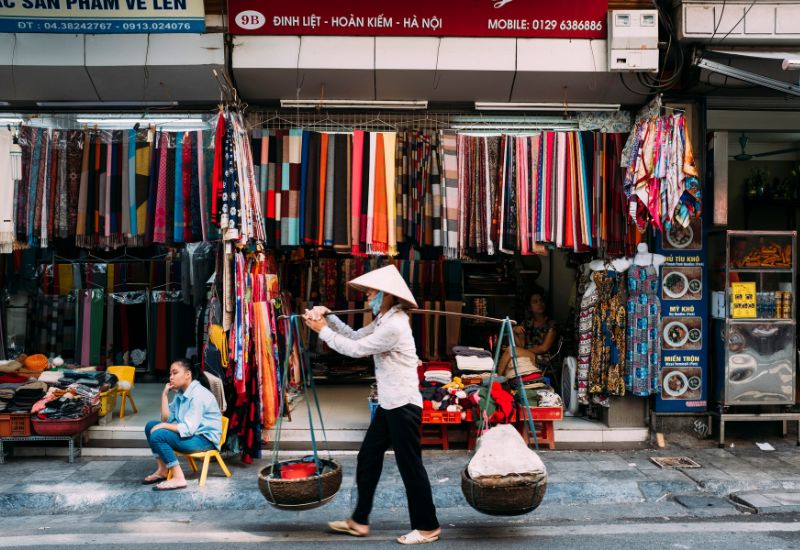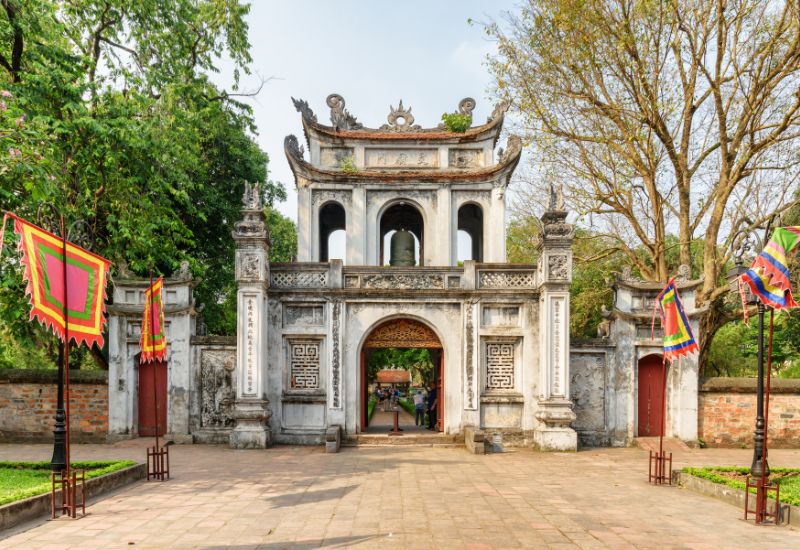Home /
Vietnam /
Hanoi
There’s only a handful of cities in the world that truly deserve ‘must visit’ status and Hanoi is certainly one of them. While most people can only dream about a fleeting trip to Hanoi – if they’re lucky – ‘living like a local’ and working as EFL teacher in this magnificent city is a realistic proposition for anyone with a sense of adventure.
Hanoi is Vietnam’s capital city and the seat of government. It’s noticeably smaller than Ho Chi Minh City in the south, but the pace of life is similarly frenetic. While Ho Chi Minh City is often referred to as Vietnam’s ‘engine room’, Hanoi is more of a ‘grand old lady’.
It’s tough to pin down what makes Hanoi such a special place. Is it because there’s history, culture and art on display in seemingly every street and alleyway? Unquestionably, the local people are right up there with the friendliest you’ll find in Southeast Asia. Is it the street markets, the pop-up shops, the lakes dotted around the city or easy access to Halong Bay, Sa Pa and other sites in Vietnam that are known world-wide? Perhaps Hanoi is a special place for a TEFL course because of all of the factors noted above, plus a lot more.
One of the great things about teaching EFL in Hanoi is the amount of free time you’ll have to really absorb what the city has to offer. The ‘Old Quarter’ in Hanoi is a brilliant place to meander around, sample local delicacies, catch up with friends for a cold beer, or to simply find a quiet place and watch the world go by. It’s not possible to be bored in the Old Quarter. On every visit, there will be something that captures your imagination. If monuments, museums and colonial buildings are your thing, quite literally you could fill your diary for the next two years at least. Even if you’re not into monuments and the like, the resting place of the ‘father’ of modern Vietnam, Ho Chi Minh, Hanoi affords an experience that you’ll carry with you for the rest of your life. If you’re a person who enjoys passive recreational pursuits, you’ll be spoilt for choice in Hanoi. There’s something for everyone.
Like most other large cities in Southeast Asia, Hanoi is well-serviced by cheap public transport options, supermarkets, fresh food markets, banks, pharmacies, hospitals, post offices, restaurants, pubs - and more coffee shops than you’ll have time to visit, no matter how long you choose to live in the city. Western-style malls are scattered around the city, which is handy to know in the event you’re craving something from your home country – or need respite from the high humidity, especially during the summer months.
Register now & get certified to teach english abroad!
The School
Our TEFL training centre in Hanoi is located in Ba Dinh District, less than five-minutes by taxi from the city’s popular ‘Old Quarter’. Ba Dinh District is characterised by a mix of small and medium size businesses (including laundromats), restaurants, coffee shops, ‘mum and dad’ grocery stores and residential dwellings. There is a large hospital nearby. The local area is well-serviced by public transport. Pretty much everything you’ll need during your TEFL programme, can be found within easy walking distance.
Ba Dinh District has a strong reputation for being a safe place to live, work, shop and study, but it’s important to be vigilant and to take basic safety precautions during your TEFL course in Hanoi.
Your TEFL Instructor in Hanoi is a specialist, highly qualified, vocational TEFL trainer, supported by a Location Manager who is fluent in Vietnamese and English. Your TEFLL trainer will ensure you have the knowledge, skills and government-regulated certification that are pivotal to being a terrific EFL teacher. The Location Manager in Hanoi has a range of responsibilities including facilitating observation and teaching practice classes, problem solving, extending a helping-hand – and job placement at the end of the course.
Accommodation
The fee for TEFL programme in Hanoi does not include accommodation, but our local partners on the ground will provide ‘hands-on’ support (free of charge) to help you find a place that will meet your personal needs. What does ‘hands-on’ support mean? After you have booked in for the TEFL programme, you’ll receive a list of accommodation options in the local area with all the information you need to make an informed choice, including clear photographs, the exact location, the contact details, price, fixtures (for example, air conditioning and cable television) and internet strength.
For 25 nights’ accommodation in Hanoi within reasonable travelling distance of the TESOL training center, you can realistically expect to pay between US $250 (basic) and US $500 (superior). The minimum cost is US$4.50 per night in a 12-bed shared room.
Once you have settled on the accommodation option that’s best for you, our staff on the ground can finalise the booking on your behalf, or you can take care of it yourself; your choice.
Course dates
![]() Coming soon...
Coming soon...
Please check out our other course locations if you wish to attend a course before this one becomes available...
Course fees
The total price is divided into: deposit and balance.
The deposit may be paid via a) credit card b) Paypal c) wire transfer d) Western Union.
The balance of the course fee must be paid by cash, PayPal or bank transfer directly to the training center on the first day of the course.
Deposit
USD 550to be paid in advance
+
Balance
USD 1107 to be paid on arrival
Accomodation Fees
The accommodation fees are not part of the course price and you are free to choose whichever accommodation option you prefer.
If you choose to use our accommodation, it should be paid for either by cash, PayPal or bank transfer directly to the school at the start of the course.
starting from
USD 130
(to be paid on arrival)
Frequently Asked Questions
-
How do I get a background (police) check?
Expand 
- If you’re an American citizen – it’s best to obtain a background check from the FBI:
https://www.fbi.gov/services/cjis/identity-history-summary-checks
- If you’re a citizen of the United Kingdom – the basic background check is what you need to obtain:
https://www.gov.uk/request-copy-criminal-record
- If you’re an Australian citizen – you need a background check from the Australian Federal Police:
https://www.afp.gov.au/what-we-do/services/criminal-records/national-police-checks
- If you’re a South African citizen – you need a Police Clearance Certificate issued by the South African Police Service:
https://www.gov.za/services/travel-outside-sa/how-apply-police-clearance-certificate-pcc
- If you’re Canadian citizen – you need a background check from the Royal Canadian Mounted Police: http://www.rcmp-grc.gc.ca/en/criminal-record-and-vulnerable-sector-checks
- Citizens of countries not listed above should check with the Department of Justice in their capital city.
-
Where will I meet your representative at the airport?
Expand 
Airport collection is an optional extra (US $30.00).
If you have booked airport collection from the International Terminal in Hanoi, when you exit the airport building, make your way to upright pylon number 11, located close to the pedestrian bridge. You will see a representative of our partner organisation holding a sign with your name on it. If you have any issues at the airport or if you get lost, please call our duty officer on cell-phone number: +84 906 284 339 (international), 0906 284 339 (local).
-
How will I be assessed?
Expand 
This is an intensive, government-regulated TESOL programme that involves a time commitment of approximately 150 hours over a 4-week period. It deliberately involves a lot of work - and comes with high expectations. You will be assessed from the first day of the TESOL course – punctuality, attitude and input are really important in the teaching profession. In weeks one and two, the emphasis is on ‘theory’. Most of the practical teaching component will take place in weeks three and four. There is no formal examination as such.
You’re required to upload completed assessment tasks to a Learning Platform, which is relatively easy to use. The Learning Platform will allow you to repeat an assessment task up to three times without penalty. Allowing more than three attempts is at the discretion of our local partners - and may result in a reassessment fee. The best way to avoid having to repeat an assessment task and potentially incur a reassessment fee, is to: 1. carefully read and follow the instructions for each task, 2. don't cut corners, and 3. conduct a 'self-audit' process before you hit the submit tab.
With our TESOL course in Hanoi, each task will be assessed as 'competent' or 'not yet competent'. You must achieve a 'competent' grade in all Modules to be eligible for government-regulated TESOL certification.
-
What does hands-on’ job help mean?
Expand 
As soon as you have submitted the assessment tasks associated with the course (due in week 4), our partners in Hanoi will help you put together a quality CV and then start the process of referring you to schools in our extensive network.
Moreover, the team on the ground are always happy to offer ‘mock’ interviews, advice on employment agreements and background information on prospective employers.
You can be assured that there are many more English teaching positions available in Vietnam than there are qualified people to fill the positions. Most graduates of the TESOL programme in Hanoi start a paid teaching job within 7 days of completing the course.
-
Should I be concerned about my personal safety?
Expand 
These days Hanoi is no more dangerous than New York, London, Sydney and most other large cities. Having said this, it pays to be vigilant especially when carrying a bag or using a cellphone in a public place. Placing your wallet in your back pocket is another ‘no, no’.
-
I've heard horror stories about the traffic congestion. What can you tell me?
Expand 
There’s no doubt about it, the traffic in Hanoi is chaotic. Believe it or not, you do get used to it. They key is to allow plenty of time to get from point A to Point B.
-
How can I keep in touch with home?
Expand 
Our partners will help you to buy a new SIM card so you can easily make local and international phone calls. The internet is cheap and readily available in Southeast Asia so options like Skype and Zoom are viable.
-
What’s the weather like in Hanoi?
Expand 
Hanoi experiences all four seasons with the same timelines as other countries in the northern hemisphere. The summer months tend to be hot, with high rainfall and humidity, whereas in winter, it tends to be much cooler and dry.
-
How soon after the course will I receive my certificate?
Expand 
Certificates typically arrive at the location where you did your training within a matter of days after you have successfully completed all of the assessment tasks and related documentation. Why can’t I get my certificate immediately? The independent assessment process (and the issuing of certificates) takes place outside of Vietnam. This external process is central to your certificate having international recognition. You will be notified by email when your certificate is available for collection.
-
What happens if I choose to move before my certificate is available for collection at my training centre?
Expand 
There isn’t a postage fee built into the cost of the TESOL package. Why? Conservatively, 90% of certificates are collected at the training location. It would be unfair to bill all customers for a service that the vast majority will not use.
If a student wants their certificate posted somewhere, we can certainly do that for the cost of the postage after receiving a written request. The postal fee is set by the local Post Office, with no mark up from our local partners.
-
How many hours of teaching practice will I have during the course?
Expand 
Our TESOL course includes a minimum of 14 hours practical teaching experience with ‘actual’ ESL students. The first 6 hours are all about observing and getting a feel for what it is like working as an ESL teacher. We pair you with an experienced teacher and you participate in his or her classes. Once you have finished the 6 hours of class observation, you then move on to complete a minimum of 8 hours of critical assessed teaching practice – with ‘actual’ students involved in ongoing classes.
-
How long will I have access to the Student Learning Portal?
Expand 
TESOL students have access to the portal from when they start the TESOL course in Hanoi to when they finish the course. The content on the portal is intellectual property that’s protected by Copyright. We’re required by our insurers to have strategies in place to protect our intellectual property and limiting access to current students (only) is one of a number of ways that we seek to meet our obligations
-
Do I need to bring a laptop with me?
Expand 
You will definitely need a laptop during the TESOL course. If you don’t own a laptop, it might be possible to hire one from our local partners for your personal use.
-
How many students are there in each TESOL course group?
Expand 
On average there are 14 students in each TESOL course in Hanoi. Students who enrol in our TESOL programme come from all corners of the world with around 30% being non-native English speakers.
-
Do I need travel Insurance?
Expand 
Travel insurance – with decent medical coverage – is always a smart move.
-
What are my accommodation options?
Expand 
You will have received a separate PDF document that identifies accommodation options in Hanoi for your consideration. There is no obligation to choose one of the suggested options. We encourage all TESOL students to research on the internet - Agoda, Airbnb and similar - for the best possible deal located within reasonable travel distance of the training location.
-
What’s the dress code for the course?
Expand 
You must wear professional and culturally appropriate attire when observing or teaching English language classes in Vietnam. Here is a general guide:
For males, professional attire includes, but isn’t limited to: suit type pants, a belt, a business shirt with a collar, lace up black or brown shoes and socks. While most schools require male teachers to wear a tie, this isn’t the case during your TESOL programme.
For females, professional attire includes, but isn’t limited to: slacks, a belt, a business type shirt, sensible shoes for standing on your feet for an extended period, a dress of appropriate length - keep in mind your teaching work may on occasions require you to sit or crawl around on the floor.
While observing or teaching English language classes jeans, shorts, tee shirts, polo tops, sandals and alike - casual clothes - are definitely out.
Outside of observation and teaching practice classes, TESOL students are free to wear casual clothes to class.
-
What vaccinations should I have before I arrive in Vietnam?
Expand 
Almost certainly, schools in Vietnam will expect that you have completed a full ‘course’ of covid vaccinations.
Vaccination advice related to Covid and other diseases can change rapidly and often without formal notice. With this in mind, it’s best to consult your family doctor before travelling abroad.
-
What documents should I bring with me?
Expand 
On top of your visa and passport, it’s very important that you bring the following key documentation with you:
- the original version of any qualification you hold (degree / diploma); and
- background (police) check – must be no more than 6 months old when presented
Note: Students are strongly advised to have their qualifications and background check notarised and legalised in their home country. Why? It’s not always possible to complete this process when you’re abroad.
Share this page
 Coming soon...
Coming soon...








